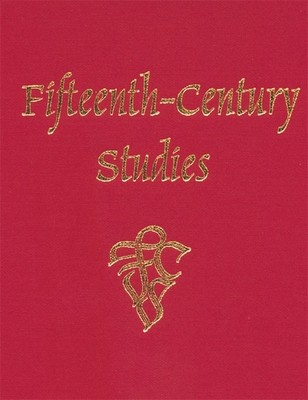
- We will send in 10–14 business days.
- Publisher: Camden House (NY)
- ISBN-10: 1571130810
- ISBN-13: 9781571130815
- Format: 16.1 x 23.4 x 2.4 cm, kieti viršeliai
- Language: English
- SAVE -10% with code: EXTRA
Fifteenth-Century Studies Vol. 27 (e-book) (used book) | bookbook.eu
Reviews
Description
Special issue focusing on violence in fifteenth-century life, text, and image: warfare and justice, violence in family and milieu (court, town, village, and forest), hagiography, ethnicity and xenophobia, gender relations and sexual violence, brutality on the stage, and the relation of text and image in the depiction of violence.
Founded in 1977 as the publication organ for the Fifteenth-Century Symposium, Fifteenth-Century Studies has appeared annually since then. It publishes essays on all aspects of life in the fifteenth century, including literature, drama, history, philosophy, art, music, religion, science, and ritual and custom. The editors strive to do justice to the most contested medieval century, a period that has long been the stepchild of research. The fifteenth century defies consensus on fundamental issues: some scholars dispute, in fact, whether it belonged to the middle ages at all, arguing that it was a period of transition, a passage to modern times. At issue, therefore, is the very tenor of an age that stood under the influence of Gutenberg, Columbus, the Devotio Moderna, and Humanism.Volume 27 is a special issue offering a selection of outstanding papers on violence that will interest students of medieval history and the early Renaissance, the humanities, art history, sociology, anthropology, and even the general reader. The articles highlight warfare and justice, violence in family and milieu (court, town, village, and forest), hagiography, ethnicity and xenophobia, gender relations and sexual violence, brutality on the stage, and the relation of text and image in the depiction of violence. Edelgard E. DuBruck is professor in theModern Languages Department at Marygrove College in Detroit; Yael Even is associate professor of Art and Art History at the University of Missouri, St. Louis.
EXTRA 10 % discount with code: EXTRA
The promotion ends in 21d.10:21:23
The discount code is valid when purchasing from 10 €. Discounts do not stack.
- Publisher: Camden House (NY)
- ISBN-10: 1571130810
- ISBN-13: 9781571130815
- Format: 16.1 x 23.4 x 2.4 cm, kieti viršeliai
- Language: English English
Special issue focusing on violence in fifteenth-century life, text, and image: warfare and justice, violence in family and milieu (court, town, village, and forest), hagiography, ethnicity and xenophobia, gender relations and sexual violence, brutality on the stage, and the relation of text and image in the depiction of violence.
Founded in 1977 as the publication organ for the Fifteenth-Century Symposium, Fifteenth-Century Studies has appeared annually since then. It publishes essays on all aspects of life in the fifteenth century, including literature, drama, history, philosophy, art, music, religion, science, and ritual and custom. The editors strive to do justice to the most contested medieval century, a period that has long been the stepchild of research. The fifteenth century defies consensus on fundamental issues: some scholars dispute, in fact, whether it belonged to the middle ages at all, arguing that it was a period of transition, a passage to modern times. At issue, therefore, is the very tenor of an age that stood under the influence of Gutenberg, Columbus, the Devotio Moderna, and Humanism.Volume 27 is a special issue offering a selection of outstanding papers on violence that will interest students of medieval history and the early Renaissance, the humanities, art history, sociology, anthropology, and even the general reader. The articles highlight warfare and justice, violence in family and milieu (court, town, village, and forest), hagiography, ethnicity and xenophobia, gender relations and sexual violence, brutality on the stage, and the relation of text and image in the depiction of violence. Edelgard E. DuBruck is professor in theModern Languages Department at Marygrove College in Detroit; Yael Even is associate professor of Art and Art History at the University of Missouri, St. Louis.


Reviews